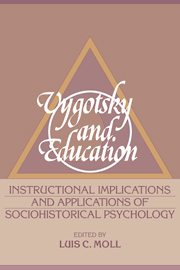Book contents
- Frontmatter
- Contents
- List of contributors
- Preface
- Acknowledgments
- Introduction
- Part I Historical and theoretical issues
- Part II Educational implications
- Part III Instructional applications
- 11 Changes in a teacher's views of interactive comprehension instruction
- 12 Learning to read and write in an inner-city setting: A longitudinal study of community change
- 13 Writing as a social process
- 14 Creating zones of possibilities: Combining social contexts for instruction
- 15 The zone of proximal development as basis for instruction
- 16 Detecting and defining science problems: A study of videomediated lessons
- 17 Assisted performance in writing instruction with learningdisabled students
- Name index
- Subject index
16 - Detecting and defining science problems: A study of videomediated lessons
Published online by Cambridge University Press: 05 June 2012
- Frontmatter
- Contents
- List of contributors
- Preface
- Acknowledgments
- Introduction
- Part I Historical and theoretical issues
- Part II Educational implications
- Part III Instructional applications
- 11 Changes in a teacher's views of interactive comprehension instruction
- 12 Learning to read and write in an inner-city setting: A longitudinal study of community change
- 13 Writing as a social process
- 14 Creating zones of possibilities: Combining social contexts for instruction
- 15 The zone of proximal development as basis for instruction
- 16 Detecting and defining science problems: A study of videomediated lessons
- 17 Assisted performance in writing instruction with learningdisabled students
- Name index
- Subject index
Summary
At five years old, mortals are not prepared to be citizens of the world, to be stimulated by abstract nouns, to soar above preference into impartiality; and that prejudice in favour of milk with which we blindly begin, is a type of the way body and soul must get nourished at least for a time. The best introduction to astronomy is to think of the nightly heavens as a little lot of stars belonging to one's own homestead.
George Eliot, Daniel DerondaAccording to many educators, the core concern of teaching elementary science is maintaining children's interest in how the world works (Hawkins, 1983; National Science Teachers Association, 1982; Rowe, 1978). When they are curious, children are willing to go below the surface appearance of events and learn about the less self-evident properties of matter. It is hoped that, as they explore deeper explanations and relationships, children learn analytic and critical skills to apply creatively to novel events they encounter later, in school and out. Encouraging such creative thinking among students is another goal of science educators. Related to this concern is the problem of motivating learning or discovery of scientific concepts when the school environment functionally does not demand a higher level of analysis and prediction (Horton, 1967), except for the purpose of getting a passing grade. Teachers have attempted to satisfy these demands of science teaching, for example, by defining science problems or tasks that are related to children's experiences in interesting ways, yet require higher levels of understanding and analysis for completion.
- Type
- Chapter
- Information
- Vygotsky and EducationInstructional Implications and Applications of Sociohistorical Psychology, pp. 372 - 402Publisher: Cambridge University PressPrint publication year: 1990
- 2
- Cited by



